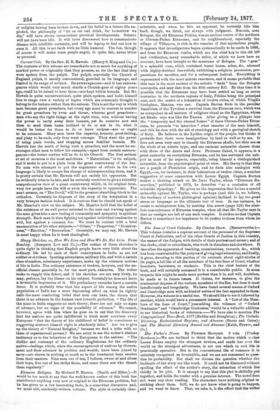Sleepy Sketches; or, How We Live and How We Do
Not Live. From Bombay. (Sampson Low and Co.)—The author of these sketches is quite right in thinking that English people know very little about the ordinary life led by such of their countrymen in India as are not soldier or civilians. Sporting adventures, military life, and with a certain class of readers, missionary experiences, make up the common notions of life in India. The ordinary existence of traders, lawyers, and the un- official classes generally is, for the most part, unknown. The writer seeks to supply this defect, and if his sketches are not very lively, he may, perhaps, lay the blame on his subject. Certainly he does not leave a favourable impression of it. His preliminary remarks have a certain force. It is probably true that the aspect of life among the native population of India has a most depressing effect on what he rightly calls the most comforting belief that men can have, the theory that there is an advance in the human race towards perfection. "The life of the mass in India suggests no such theory, there are not only no signs of advance, but no signs of the possibility of advance." We cannot, however, agree with him when he goes on to say that the discovery that the natives are quite indifferent to truth must convince every European "that the theory of his childhood of belief in conscience as suggesting abstract ideas of right is absolutely false." Are we to give up the theory of" Natural Religion," because we find a tribe with no ideas of supernatural powers ? We are sorry to see the writer's distinct testimony as to the behaviour of the Europeans to the natives. "The dislike and contempt of the ordinary Englishman for the ordinary native—feelings which, since the encouragement of natives by Govern- ment and their advance in position and wealth, have been joined by envy—are shown in nothing so much as in the treatment boys receive from their masters. Nine men out of ten, I believe, swear at and abuse their boys, five out of ten strike them, and some there are who thrash them regularly."


































 Previous page
Previous page